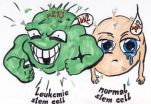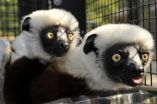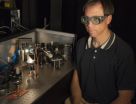(Press-News.org) Narcissists tend to lack empathy, which can cause problems for themselves, the people around them and society in general. However, new research published today from the University of Surrey, suggests that with the right focus, people with narcissistic tendencies can feel empathy for another person's suffering. This may be important in helping to prevent the often violent or anti-social behaviours that some narcissists are prone to and the crimes that are committed as a result.
The research, published in Personality and Social Psychology Bulletin, studied participants in three different situations. The first study analysed how sympathetic they were to someone of their own gender suffering from a relationship break-up. Asked to rate on a scale of 1 – 8 how much empathy they felt, the results showed that those with high narcissism lacked empathy for the distressed person.
However, in the second study, which focused on a woman who had suffered domestic violence from a male perpetrator, half of participants were specifically asked to imagine how that person feels. The results showed that individuals high in narcissism were capable of higher empathy when instructed to take that person's perspective.
This result was further tested via the participants' heartbeats, as increases in heart rate are known to indicate an empathic response to other people's emotions and suffering. When listening to an audio blog of someone suffering from a relationship break-up, narcissists showed a significantly lower heart-rate than non-narcissistic participants. However, when asked to take the character's perspective, the narcissists' heart-rates increased to the same levels as those with very low narcissistic tendencies.
"Our results clearly show that if we encourage narcissists to consider the situation from their teammate or friend's point-of-view, they are likely to respond in a much more considerate and sympathetic way," said lead author, Dr Erica Hepper from the University of Surrey.
"This is not only good for the people around them, but also for their own wellbeing in the long-run as empathy helps to form and maintain close relationships.
"Our research provides a crucial breakthrough, as other studies suggest narcissism is increasing across cultures. If narcissists have the physical capacity to feel empathy, interventions could be designed to help them do so in their everyday lives, with benefits to themselves, their family, friends and colleagues and for society as a whole."
INFORMATION:
Media enquiries: Peter La, Media Relations Office at the University of Surrey, Tel: 01483 689191 or E-mail: p.la@surrey.ac.uk
Narcissists can feel empathy, research finds
2014-05-30
ELSE PRESS RELEASES FROM THIS DATE:
Eating prunes can help weight loss
2014-05-30
Research by the University of Liverpool has found that eating prunes as part of a weight control diet can improve weight loss.
Consumption of dried fruit is not readily recommended during weight loss despite evidence it enhances feelings of fullness.
However, a study by the University's Institute of Psychology, Health and Society of 100 overweight and obese low fibre consumers tested whether eating prunes as part of a weight loss diet helped or hindered weight control over a 12-week period.
It also examined if low fibre consumers could tolerate eating substantial ...
Cochrane review on use of rectal artesunate for severe malaria
2014-05-30
Researchers from the Cochrane Infectious Diseases Group, hosted at LSTM, conducted an independent review of the effects of pre-referral rectal artesunate for people with severe malaria, published in the Cochrane Library today. The review follows a large trial of rectal artesunate in 2009 which led the World Health Organization to recommend its use.
Severe malaria is a serious medical condition caused by infection with the Plasmodium parasite. It is treated by giving injections of antimalarial drugs, which need to be started as quickly as possible to reduce the risk of ...
One cell's meat is another cell's poison
2014-05-30
As a new therapeutic approach, Janus kinases are currently in the limelight of cancer research. The focus of interest is the protein JAK2. By inhibiting this protein one tries to cure chronic bone marrow diseases, such as myelofibrosis and chronic myeloid leukemia (CML).
Loss of JAK2 is advantageous for leukemia cells
Scientists working with Veronika Sexl at the Institute of Pharmacology and Toxicology may initiate a transformation of thought in regard of JAK2 inhibition. To simulate the human disease as accurately as possible, the scientists used a mouse leukemia ...
Chinese scientists map reproductive system's evolution as dinosaurs gave rise to birds
2014-05-30
As winged dinosaurs underwent a series of evolutionary changes during the transition into Aves, or birds, one pivotal transformation was the appearance of a single-ovary reproductive system. "The most widely accepted hypothesis for the presence of a single functional ovary in living birds is that the right ovary … was lost to reduce body mass in gravid females during flight," report a team of Chinese scientists who are adding new details to the mosaic of understanding how terrestrial dinosaurs gave rise to birds and powered flight.
These scientists, led by the director ...
Observing the random diffusion of missing atoms in graphene
2014-05-30
This news release is available in German. Imperfections in the regular atomic arrangements in crystals determine many of the properties of a material, and their diffusion is behind many microstructural changes in solids. However, imaging non-repeating atomic arrangements is difficult in conventional materials. Now, researchers at the University of Vienna have directly imaged the diffusion of a butterfly-shaped atomic defect in graphene, the recently discovered two-dimensional wonder material, over long image sequences. The results are published in the prestigious journal ...
Genome sequences show how lemurs fight infection
2014-05-30
DURHAM, N.C. -- The young lemur named Eugenius started to get sick. Very sick. He was lethargic, losing weight and suffering from diarrhea. Duke Lemur Center veterinarians soon pinpointed the cause of his illness: Eugenius tested positive for Cryptosporidium, a microscopic intestinal parasite known to affect people, pets, livestock and wildlife worldwide.
In humans, thousands of cases of Cryptosporidium are reported in the United States each year, spread primarily through contaminated water.
Since Eugenius was the first animal diagnosed in 1999, the parasite has caused ...
New printable robots could self-assemble when heated
2014-05-30
Printable robots — those that can be assembled from parts produced by 3-D printers — have long been a topic of research in the lab of Daniela Rus, the Andrew and Erna Viterbi Professor of Electrical Engineering and Computer Science at MIT.
At this year's IEEE International Conference on Robotics and Automation, Rus' group and its collaborators introduce a new wrinkle on the idea: bakable robots.
In two new papers, the researchers demonstrate the promise of printable robotic components that, when heated, automatically fold into prescribed three-dimensional configurations. ...
Radiation for prostate cancer linked to secondary cancers, study finds
2014-05-30
ANN ARBOR, Mich. — Among men treated for prostate cancer, those who received radiation therapy were more likely to develop bladder or rectal cancer, according to a new study from the University of Michigan Comprehensive Cancer Center.
"Overall the incidence of these cancers is low. But when men have received radiation treatments, it's important to evaluate carefully any symptoms that could be a sign of bladder or rectal cancer," says senior study author Kathleen A. Cooney, M.D., professor of hematology/oncology and urology at the U-M Medical School.
The study, which ...
Novel NIST laser system mimics sunlight to test solar cell efficiency
2014-05-30
Researchers at the National Institute of Standards and Technology (NIST) have developed a laser-based instrument that generates artificial sunlight to help test solar cell properties and find ways to boost their efficiency.
The novel NIST system simulates sunlight well across a broad spectrum of visible to infrared light. More flexible than conventional solar simulators such as xenon arc-lamps or light-emitting diodes, the laser instrument can be focused down to a small beam spot—with resolution approaching the theoretical limit—and shaped to match any desired spectral ...
Rush a light wave and you'll break its data, say NIST scientists
2014-05-30
Quantum information can't break the cosmic speed limit, according to researchers* from the National Institute of Standards and Technology (NIST) and the University of Maryland's Joint Quantum Institute. The scientists have shown how attempts to "push" part of a light beam past the speed of light results in the loss of the quantum data the light carries. The results could clarify how noise might limit the transfer of information in quantum computers.
The speed of light in vacuum is often thought to be the ultimate speed limit, something Einstein showed to be an unbreakable ...





